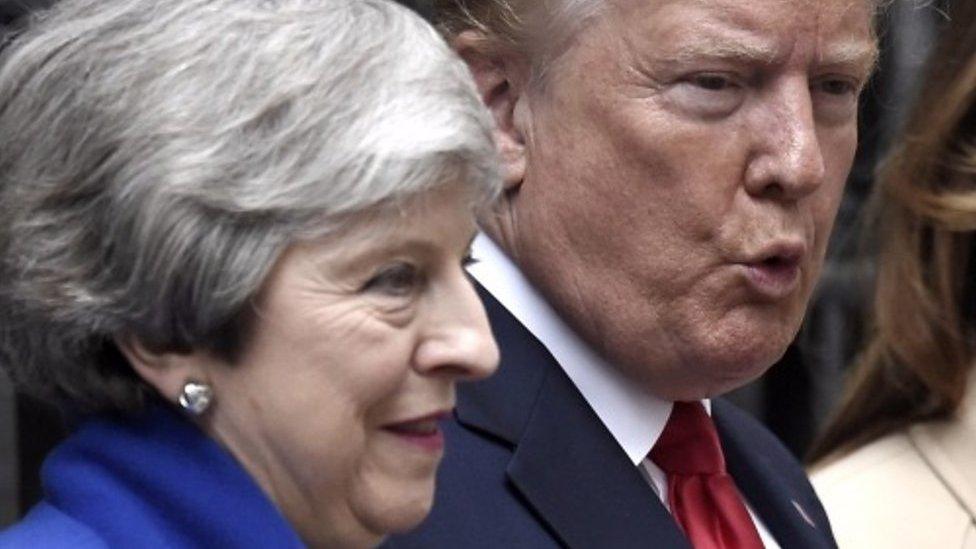Trump visit highlights crucial US-Irish economic ties
- Published
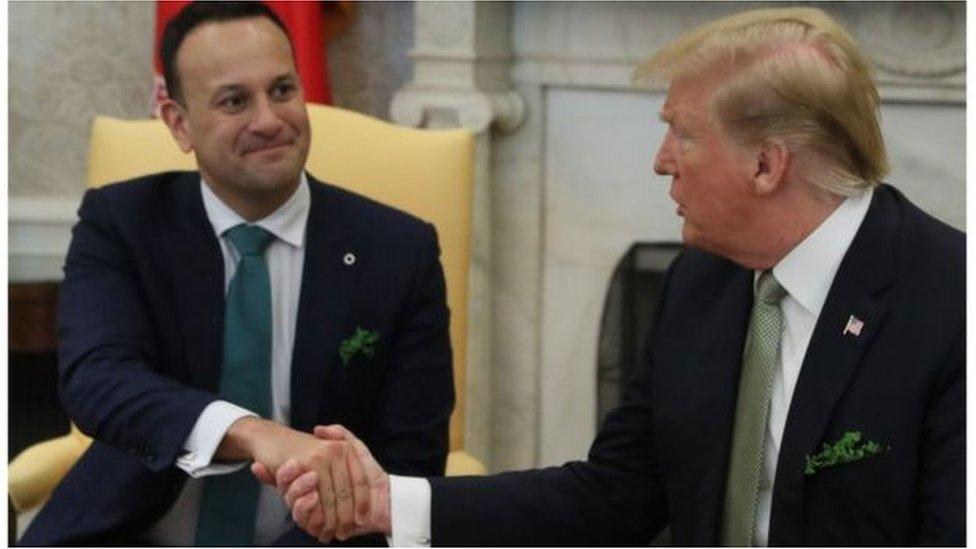
Leo Varadkar and Donald Trump met at the White House earlier this year
The improbable election of Donald Trump in 2016, coming just months after the Brexit referendum, added another element of uncertainty into the Irish economy.
Since taking office, he has radically overhauled US tax rules, shaken the foundations of global trade by slapping steep tariffs on billions of dollars' worth of goods from the EU, Canada, Mexico and China, and repeatedly expressed support for Brexit.
Just this week, he advocated the UK leave the EU without a deal - and said Nigel Farage should be involved in the negotiations.
The president lands in the Republic of Ireland later on Wednesday for a two day visit that will include a stop-over at his golf resort in Doonbeg, County Clare, and a meeting with Taoiseach (Irish prime minister) Leo Varadkar.
Given the hugely important economic ties between Ireland and the US, trade, jobs and Brexit are likely to dominate the agenda.
How extensive is the US-Irish economic relationship?
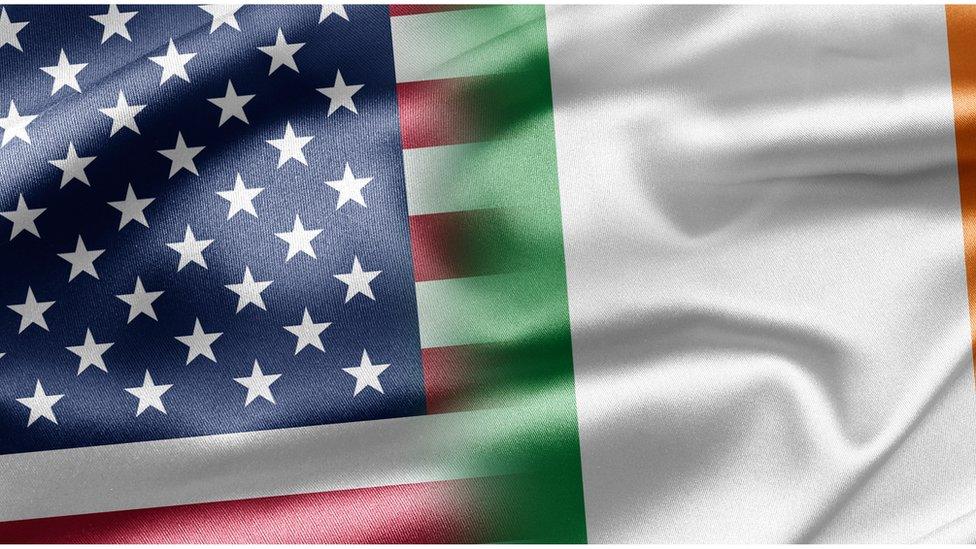
The US accounts for nearly three quarters of the foreign investment into Ireland, experts say
Big, big, big.
The US is the single largest source of foreign direct investment in Ireland, with more than 700 American companies employing an estimated 160,000 people.
"The United States accounts for about 70% of the foreign investment into Ireland and it continues to be a very strong source market across a number of sectors," says Kevin Sammon, director of global communications at IDA Ireland, Ireland's state agency responsible for attracting inward investment.
"US businesses have been locating in Ireland for over 100 years and, judging by recent investment numbers, they continue to see Ireland as a reliable partner for them in Europe."
Some of those companies are among the world's largest, including technology giants like Facebook, Apple, Google and Microsoft, as well as a slew of drug companies such as Pfizer and healthcare giant Johnson & Johnson.
Experts say they've been lured to Ireland by a combination of factors, including its well-educated, multi-cultural workforce, easy access to the EU market and, of course, the relatively low 12.5% corporate tax offering.
Why has every US president since JFK visited Shannon Airport?
That's attracted the ire of President Trump.
He has, on a number of occasions, name-checked Ireland as a destination of choice for US companies seeking a low-tax base. Ireland has also made headlines internationally for the aggressive tax planning of some of the companies that have made the country their home, and their use of tax loopholes.
President Trump unveiled a sweeping tax reform plan in 2017 to encourage US companies to bring earnings back to the US.
Last St Patrick's Day, he quipped that the Irish were "sharp, they're smart, they're great", external.
"And they're brutal enemies."
It's not all one-way, though.
There are about 800 Irish companies active in the US market, employing 100,000 US citizens across the country, according to the American Chamber of Commerce.
They’re sharp, they’re smart, they’re great. And they are brutal enemies. You have to keep them as your friend. Always keep them as your friend."
"Ireland is now the ninth largest investor in the United States," says Mark Redmond, head of the American Chamber of Commerce Ireland.
"It's very much a two-way street. The US administration would have a strong focus in encouraging Irish companies to create more jobs in the States."
Is the relationship all about jobs?
Yes and no.
The US is also a significant location for Irish goods exports, pipped only by the EU as a whole, external.
"You cannot overstate the importance of the US-Irish relationship for the Irish economy," says Prof Ron Davies, head of economics at University College Dublin.
"The multinationals are a big part of it, and maybe they don't pay as much tax as some people think they should, but they still pay a significant amount in terms of tax."
The economic links:
700Number of US multinational companies in Republic of Ireland
160,000Number of people employed in those companies
70%US share of total foreign investment into RoI
Since Ireland's recovery began following its crippling recession, its corporation tax take has dramatically surged.
It increased by 26% last year to €10.4bn (£9.2bn), driven by higher and increased payments from manufacturing companies and big multinational firms.
The share of corporation tax paid by the top 10 corporate taxpayers now accounts for 45% of all the tax paid.
"There is a special relationship there that has massive economic benefits," adds Prof Davies.
But it also, arguably, leaves Ireland vulnerable to outside economic shocks.
How so?
Changes in the global trade order for one - something which President Trump has set his eyes on.
In March 2018, he said trade wars were good, tweeting that the US was "losing billions of dollars on trade" and would find a trade war "easy to win".
During his election campaign, he spoke aggressively about trade, US agreements and even some of the country's trading partners.
Since the late 1940s, the global trend has been towards reducing or eliminating barriers to trade and global commerce.
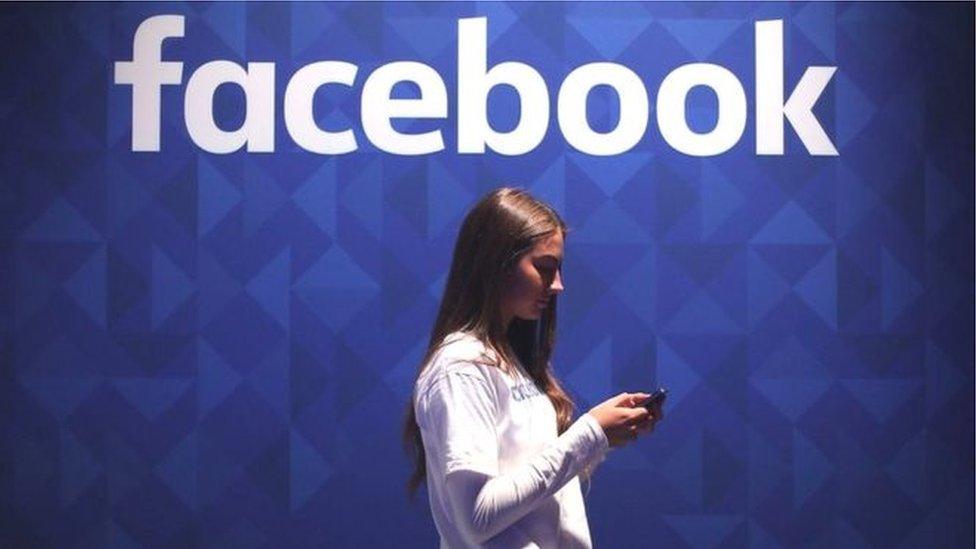
Facebook is one of the US companies which has European headquarters in Ireland
But Mr Trump is sceptical about that policy.
Economists have warned that, given the open nature of Ireland's economy, that could spell trouble.
"What he's talking about doing to international trade norms, that is going to have a very swift, very direct impact on Ireland," says Prof Davies.
"He can't pick a trade war with Ireland because we're part of the EU, but do I think he can pick a trade war with the European Union? Sure, it seems to be his thing."
Has President Trump's rhetoric affected the Irish economy?
The Irish economy performed strongly once again in 2018, and the IDA says there has yet to be an impact on US investment flows into Ireland.
But its chief executive, Martin Shanahan, has urged caution and says Ireland cannot be complacent.
He said there had been a slowdown in decision-making from potential US investors.
"Ireland is a small open trading economy, and increased nationalism and protectionism is likely to have an impact on future FDI figures," he said last year, external.
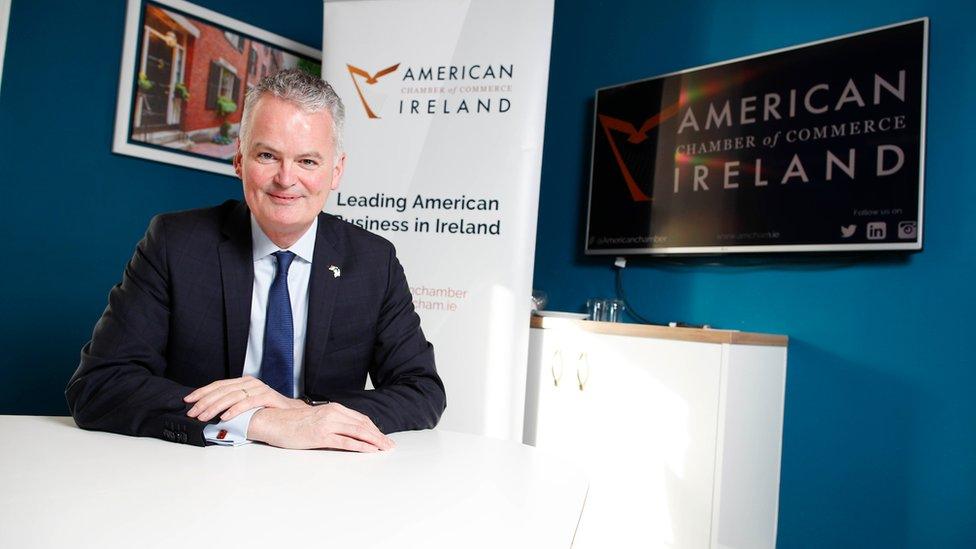
Mark Redmond, head of the American Chamber of Commerce Ireland, says there is huge expansion taking place in Ireland
Prof Davies says the president's support for Brexit is a negative for Ireland.
"For me the biggest worrying aspect is his sticking his fingers in Brexit, encouraging Boris Johnson, saying Nigel Farage should have a place at the [negotiating] table, because as the UK goes, so does Ireland," he says.
That could mean a greater risk of a hard Brexit, he says, arguing that would be "extraordinarily bad news for Ireland".
But Mr Redmond says there are still "very significant" job announcements from US firms right across Ireland.
"Seven out of 10 of the leadership of US multinationals in Ireland say that Ireland is a better place to invest than it was three years ago. So there is huge ambition and huge expansion going on," he says.
"We've never seen the level of ambition in both directions in terms of business investment."
- Published18 February

- Published4 June 2019
